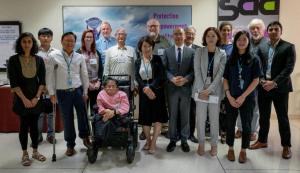
Ensuring universal design-based accessibility of the physical environment, public transport, knowledge, information and communication is a precondition to enhance the political, social and economic participation of an estimated 690 million persons with disabilities in Asia and the Pacific.
Accessibility supports the increased participation of all persons, with or without disabilities. Furthermore, as the region is experiencing unprecedented population aging, universal design-based accessibility increases the usability of the physical and information environment for older persons. Increasing accessibility through universally designed buildings, products and services effectively support the full participation of all persons providing both social and economic benefits to society.
Against this background, ESCAP is producing a guidebook in 2019 with the aim to motivate member States and other relevant stakeholders in Asia and the Pacific to take coordinated action to achieve comprehensive accessibility.
To inform the guidebook, the Expert Meeting on Creating Universal Design-based Accessible Societies in Asia and the Pacific was held on 13 and 14 December 2018, hosted and organised by the Social Development Division of ESCAP.
The Meeting convened technical and policy experts to discuss successes, challenges and gaps in realising universal design-based accessibility for persons with disabilties in Asia and the Pacific. The conclusion of the Meeting agreed upon the importance of drawing upon legal compliance and business perspectives to advance universal design-based accessibility. The legal compliance perspective refers to the utilisation of various types of legislations championed by accessibility focal points in all levels of the government, and the business perspective refers to the engagement of businesses to recognise and reap the economic benefits of accessibility. Recognising that both perspectives are inter-related would be key to achieving unviersal design-based accessible societies.

